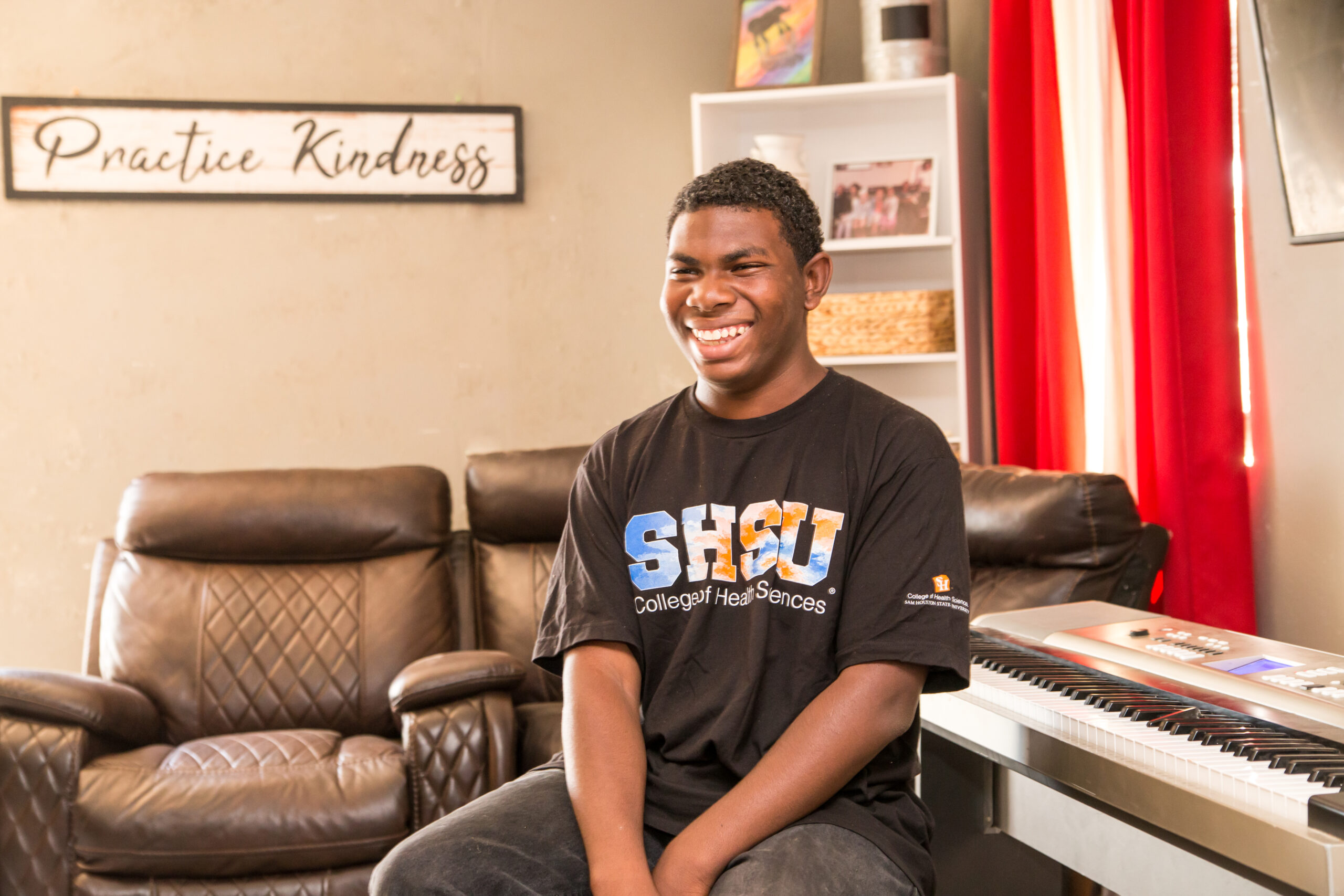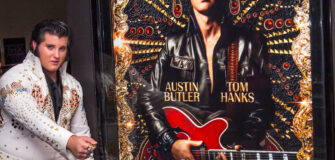An average teen with a brilliant mind…Genius…Self-driven…Logical…The real-life version of Sheldon Cooper from the CBS sitcom Young Sheldon…Lover of video games, family, and the piano. These are just a few ways to describe 15-year-old Nehemiah Juniel of Madisonville, who will become the youngest ever graduate of Sam Houston State University.
When talking to Nehemiah, it is evident his mind has far surpassed his physical age.
By age two, he was reading a dictionary and talking in complete sentences; by the age of 5, he was completing prealgebra math problems. By age 11, he was taking the TSI college entrance exam, passed it, and was ready to start down the path to medical school.
Now 15, Nehemiah is projected to graduate Summa Cum Laude from SHSU with a 3.7 grade point average in August.
“He has always been so curious,” said mom Corie Juniel. “We couldn’t keep up with the amount of information he could retain, in public school or homeschool. I feel like college saved his life, because there was just not enough to keep his mind occupied, and we couldn’t give him or teach him anything else.”
How do you feel about being the youngest SHSU graduate in the school’s history?
Really, it’s just another day. I feel the same before college as I did after. I knew I could do it, it’s just not a shock to me.
So, what led you start the college journey at such a young age?
I learn really fast. The initial plan was for me to go to public school, but they could not put up enough work to keep me interested, so I was homeschooled. Mom and Dad taught me as fast as I was willing and able to learn.
When I was 9, my sister Gabrielle, who was 14 at the time, studied for the TSI test, took it, and started college. I was like, “How come my sister can go to college, and I can’t?” I was confused; we were doing a lot of the same work, education-wise. For my parents, it was a lot of, “Is he mature enough to actually handle all the college material?” I just kept asking. So, they decided when I turned 11, I could go take the TSI and see what happened.
We went to Lone Star College in The Woodlands to take the TSI, and no one really expected me to pass it, but I thought I would. I had spent a whole year preparing for it.
What happened next?
The new question was, “What now?” I started summer classes that June at Lone Star College – University Park (Houston) campus. Pretty much up until I turned 13, there was a lot of that question. No one was ready for such a young student, and there were no policies or protocol for it.
After graduating Magna Cum Laude from Lone Star with an Associate of Science, I transferred to SHSU.
Did that sibling rivalry with your sister inspire you to begin the college journey so early?
At the beginning. Then over the next year, it was “Okay, I see I can do this now. I want to see how far I can go and make a career for myself.”
Why did you choose SHSU?
It was closer to my home in Madisonville, and also the amazing culture of the campus. The people here genuinely want to help you succeed.
Initially, my major was biomedical sciences, but for the purpose of getting my degree faster, I switched to health sciences.
In your own words, describe college life as a 15-year-old.
It feels natural. It has been an engaging experience, different and interesting. I really haven’t had many negative experiences, other than people getting used to me being so young.
Do you feel like you have to study more than other students due to your age?
No. I hear it from lecture. I’ll read the PowerPoint after class. Sometimes for math or science, I’ll use the textbook if there’s something I don’t understand or need to finish an assignment. Otherwise, I’ll leave it alone and know the information. I’ll study all the material again a day or two before a test, take the exam, and usually do really well.
What were challenges along the way, and how did you overcome them?
I’ve been told I have missed social cues a lot because of my autism. I look for them more now, and I make the best educated guess I can about why people do something, while keeping in mind I could be wrong. I’m trying to figure out the social part of college, but it’s hard.
A big challenge I had was group work. It was immediately a struggle. I was so focused on everyone having a certain job to do that, when it was open concept labs or projects with no clear rules for the right way tasks should be completed, it was a big struggle. I would get frustrated because they wouldn’t listen or would discredit my opinion. Since I’m a little older and more mature now, it has gotten better. I’ve also learned to be more understanding.
Another thing I’ve had to realize is that I must learn for understanding, not just to know the information. I really didn’t understand the difference before. I didn’t realize until college that you have to apply that knowledge.
In a psychology class I’m taking now, I’m learning that you do learn in stages of development and so up to a certain point it is very unlikely for you to grab certain concepts like abstract and complex thinking. I think that probably played a factor into my memorizing everything and hoping that was enough.
What have you enjoyed most about SHSU?
Definitely the instructors. They’ve always been very supportive, very understanding, and have reached out and offered personal assistance.
What are your plans after graduation in August?
Once I turn 16 in November, I’m going to look into finding somewhere to intern in the medical field, volunteering hours and things like that, while I study for the MCAT. Then I’ll go off to medical school, probably around 17. That’s the plan. I’m going to study to be a cardiologist.
Why cardiology?
I’ve always been interested in the human body and especially the heart. Through my own research, I have found cardiovascular disease is one of the greatest causes of death in the world. My grandfather also died from it. I want to help fight the disease however I can and find alternative methods to improve cardiovascular health for people.
Do you ever feel like you’ve missed part of your childhood by attending and completing college so early?
Well, I have spent a lot of time with my six siblings, so I’ve got plenty of childhood. We keep each other entertained a lot. I prioritized getting a college education, because that’s what I wanted to do. I want to get to medical school as fast as possible.
When at home, how do you and your siblings spend time together?
We play outside together, ride bikes, do yard work together, or build a house. While it may not always be fun at the beginning, by the end of the day, we enjoy it. Not all our interests are the same, but we are close, and the conversations are equal.
We also have six dogs, which include a Rottweiler, toy Poodle, Red Heeler, and a Guardian Shepherd. Bear, one of our Rottweilers, is my favorite. We wrestle with him in the yard, and he is very compassionate.
When you are not in school, what activities do you enjoy?
I enjoy playing my Xbox video games, especially Sonic the Hedgehog and New Development games. I’ve also been playing the piano for seven years and usually play every day. I am self-taught and play a lot by ear. I can read sheet music, but haven’t put in the time to learn how to do it efficiently. I like to play a variety of genres, including classical, jazz, rock, pop, and video game background music.
I also write music, but the problem is it becomes perfectionism. I don’t want it to be average; I want it to be original. It usually takes me at least a week, sometimes two to three months per song. I’ve written waltzes, blues, rock, and songs that are heavily percussion. I like to take basic music and experiment with it.
I also like to play chess online. I play with people around the world. For me, it is challenging to the mind.
What advice would you give other kids?
Be patient. It’s alright to get frustrated, but don’t become discouraged. As long as you keep trying, you’ll eventually reach your goal.
Also, make sure you are learning for understanding, because the foundation shows back up later on.
The Juniel family has a motto in their house – “Do what you have to do, so you can do what you want to do.” Nehemiah has taken that motto to heart, and his ‘have to do’ is medical school and becoming a cardiologist. His parents said they will support him no matter what his ‘have to do’ may be.
“Nehemiah has always had a plan,” said Corie. “We just cosign on his plan.”
Pullout:
Autism. A word that often brings negative connotation, but has an extensive spectrum of levels and has given the world some of the brightest minds known. While some with low functioning level autism may have cognitive challenges, those with high functioning level autism have genius and may or may not struggle socially.
For Juniel, who has high functioning autism, the label is not a bad thing. In fact, his mom will be the first to share and set the record straight.
“It is one of the things we’re most proud of,” said Corie. “That’s part of his drive; this is credited to his autism. He has always been very math, science, and music centered. It makes him who he is, and he wouldn’t be him without it.”
Corie and her husband Raphael never stressed a grade level to Nehemiah. He was free to work on as high of a level as he could. They followed TEA guidelines and TEKS to make sure all standards were taught, but at Nehemiah’s advanced pace.
“We learned from our experiences with Nehemiah. Now with our other kids, who are also home schooled, we teach them skills and don’t worry what grade level they are on by public school standards. If they can do the work, they do, and we move on.”
Another characteristic of autism is a mindset that has defined boundaries, and there is usually only one way to do things.
“From a really young age, he had all these rules to follow. He was super neat, and all his cars were blue, and his crayon box had to be a certain color. He was really rigid for a long time,” explained Corie.
His dad recalled Nehemiah’s obsession with warning labels that would bring borderline panic attacks if the labels weren’t followed meticulously.
However, Nehemiah’s parents said they feel college has also helped him to learn how to be more flexible in everyday life. They said it has helped him realize he has to be flexible with people, and it can’t always be one way.
One of the biggest drawbacks for many people with autism is social skills.
“Even now, he struggles with friendships, because he’s too intellectually mature for your average 15-year-old, unless you’re talking about XBox games. In general conversation, a lot of 15-year-olds just aren’t interested in trigonometry,” said Corie. “The college kids think he’s cool, but they are hanging out at places he’s too young to go. He’s still in this social weird place.”
Perhaps the most telling statement shared was, when Nehemiah was officially diagnosed at 9-years-old, he told his mom, “Finally, somebody understands me.”


